What Happened To The Arts? Is Code The New Creativity?
 Monday, February 3, 2014 at 11:51AM
Monday, February 3, 2014 at 11:51AM There is a helluva hullabaloo brewing around who codes, who doesn't code and who should be coding. My little boy is six months old and I'm seriously worried that if he isn't coding by the age of one then I'm failing as a father. His mother is a digital creative, an artist, a designer. So much for her influence then in these STEM-tastic times.
Seriously though what happened to the Arts? It seems that STEM is taking over what with the Maker Faire being hosted at the White House this time around it strikes me that the Arts (and anything related to it including it's denizens who reside within this field) must and will take firm backseat for a long time to come. While the UK follows the suit of the US in puppy-dog fashion, the 'Anti-Oik' and general antagonist Gove has been pushing STEM in the UK in the guise of coding.
I was talking to my secondary counter parts yesterday in a very impromtu drop-in and ended up talking about coding in Year 9, Raspberry Pi and how the Computer Science GCSE/ A Level is a far cry from the ICT GCSE/ A Level. In a nutshell: ICT = MS Office. As we are all too familiar with. However, this is legacy and nothing in comparison to what's coming. We talked that in Year 9 it's compulsory for the students to have experience of a wrtten language that isn't HTML (HTML doesn't count - I'd heard this but never in conversation with a teacher of KS3/4/5). The example I saw was Karel - an introductory language that can get quite complex as CodeHS demonstrates. I am really pleased to see this as it's been a long time since my programming persuasion has been in line with KS3 and 4. However much I like Python, Ruby and Scratch (Small talk/ Squeak) before it. I think we're missing a trick here though. There should be a general lineage form KS1 too and this is where the fireworks can start. We all have our favourites.
Now, I'm all for technological advances and it interests me in many ways although as an old saying goes "anything excess in life is poison." So what happened to the balance? Is creativity taking a very niche route and bound to the confines of code? Or is Coding the new creativity? Is the App Store the Pop Idol for coders with the many also-rans trying to compete with the likes of Zynga for the next Chocolate Rain? With every student who makes it near the top there are thousands who are at a mere karaoke standard trying to vie with everyone else and dropping their prices to 99c.
I feel there is an imbalance somewhere here that I can't quite put my finger on. Although, this coding leyline is exclusive unless you're inclined to digitally represent your creativity and eschew good ol' standard mediums. I think I may need to adjust my teaching style to bend the other way and only teach coding where there is an artistic flavour to hand .
The teaching of coding, I think, needs a tiny dousing of Leonardo Da Vinci and a little less Lenin; I'm going to strive to keep the true artistic balance in our future schemes.
 UK,
UK,  USA,
USA,  balance,
balance,  coding,
coding,  creativity,
creativity,  programming,
programming,  technology in
technology in  Coding,
Coding,  programming
programming 




